Andrew Cartmel's Blog, page 15
June 3, 2018
Solo: A Star Wars Story by Kasdan & Kasdan
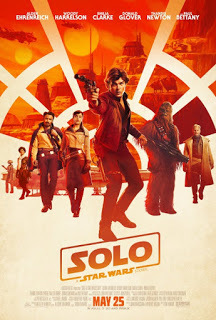 As you will be aware, unless you've spent the last few years in a fallout shelter (tempting, I know...) there are now two series of Star Wars movies running in parallel.
As you will be aware, unless you've spent the last few years in a fallout shelter (tempting, I know...) there are now two series of Star Wars movies running in parallel. Firstly we have the mainstream films, which continue to explore the core narrative, like The Force Awakens and The Last Jedi.
And then there are what I suppose we might call the sidestream movies, which have the subtitle 'A Star Wars Story', I guess to make the point they are not part of the Star Wars story.
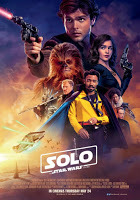 So far we've had of these two sidestream movies. The first was Rogue One, which I think is a disgracefully bad piece of film making. A lousy script and an utterly inept piece of storytelling.
So far we've had of these two sidestream movies. The first was Rogue One, which I think is a disgracefully bad piece of film making. A lousy script and an utterly inept piece of storytelling. I say this knowing full well that tens of millions of people loved this movie, and you dear reader may be one of them.
If so I apologise, but I stand my ground. Rogue One was awful. Which makes it all the sweeter to report that the new sidestream movie is just plain splendid. I simply loved it and can't wait to see it again.
 Solo: A Star Wars Story has the tremendous advantage of a script by Lawrence Kasdan, the best screenwriter every to be involved with the franchise, working in collaboration with his son, Jonathan.
Solo: A Star Wars Story has the tremendous advantage of a script by Lawrence Kasdan, the best screenwriter every to be involved with the franchise, working in collaboration with his son, Jonathan.It is, of course, a prequel which fills in the back story of Han Solo. Solo is played by Alden Ehrenreich (not an easy name to spell), who made such a favourable impression in the Coen brothers' Hollywood satire Hail, Caesar! where he played a laconic 1950s cowboy star with a fantastic command of the lasso. (He was also excellent in Stoker and Beautiful Creatures.)
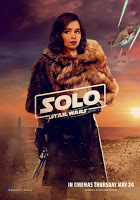 The Kasdan's have come up with a strong, simple and rather smart concept to motivate the young Solo: he's in love. And early in the movie circumstances force him to separate from his sweetheart Qi'ra (pronounced Keera), played by Emilia Clarke.
The Kasdan's have come up with a strong, simple and rather smart concept to motivate the young Solo: he's in love. And early in the movie circumstances force him to separate from his sweetheart Qi'ra (pronounced Keera), played by Emilia Clarke.Fans of Game of Thrones will know Clarke as Daenerys Targaryen (another bloody difficult name to spell). Now, there is no bigger fan of Game of Thrones than me. But I didn't even recognise that the actress playing Qi'ra was the same one who played Daenerys — her appearance is so different in this film.
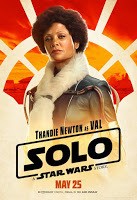 What I did recognise is that Clarke is terrific, and fantastically fetching, in Solo. Her costumes in the movie also often have a kind of cowgirl thing going on, which sort of carries on the Western theme introduced by Ehrenreich's prowess with the lasso.
What I did recognise is that Clarke is terrific, and fantastically fetching, in Solo. Her costumes in the movie also often have a kind of cowgirl thing going on, which sort of carries on the Western theme introduced by Ehrenreich's prowess with the lasso.But Solo doesn't draw on Westerns. It's basically a heist movie. Indeed it begins as a heist movie in the middle of a war, which suggests that the Kasdans might have fruitfully studied Troy Kennedy Martin's great script for Kelly's Heroes.
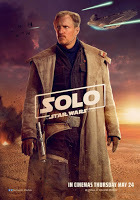 As he's drawn into the heist plot, Solo teams up with Beckett (at last an easy name), played by Woody Harrelson and Val (ditto) played by Thandie Newton, who gets to say lines like, “Viper droids headed your way.”
As he's drawn into the heist plot, Solo teams up with Beckett (at last an easy name), played by Woody Harrelson and Val (ditto) played by Thandie Newton, who gets to say lines like, “Viper droids headed your way.” Beckett and Val are kind of a Bonnie and Clyde setup — and there’s convincing chemistry when they kiss. Newton is gone all too soon from the picture.
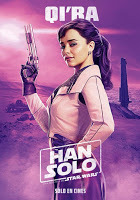 But the Kasdan's expert story has already propelled us to a new and engrossing situation as Solo finds his lost love — only to discover that she's the captive plaything of a genuinely nasty villain, Dryden Vos (great name), played by the outstanding Paul Bettany.
But the Kasdan's expert story has already propelled us to a new and engrossing situation as Solo finds his lost love — only to discover that she's the captive plaything of a genuinely nasty villain, Dryden Vos (great name), played by the outstanding Paul Bettany.Which is not to suggest that Qi'ra is some kind of passive ornament. Indeed, she's basically a kickass film noir femme fatale.
Although, as leading lady, she has some serious competition from the fabulous L3-37, a (literally) rebellious female droid unforgettably brought to life by Phoebe Waller-Bridge a British actor, comedian and writer best known for Fleabag.
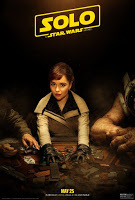 To say any more would be to spoil the fun for you. But I will just remark that this is a really standout cast, making great use of a peerless script in which all the icons and tropes and characters we associate with Han Solo (Chewbacca, the Millennium Falcon, Lando Calrissian) are skilfully and joyfully introduced.
To say any more would be to spoil the fun for you. But I will just remark that this is a really standout cast, making great use of a peerless script in which all the icons and tropes and characters we associate with Han Solo (Chewbacca, the Millennium Falcon, Lando Calrissian) are skilfully and joyfully introduced.The movie is directed by Ron Howard. He took over from the team of Phil Lord and Christopher Miller (The Lego Movie), reportedly because they were taking too many liberties with the Kasdans' script.
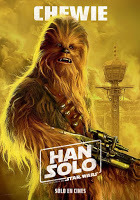 If so, they deserved to go.
If so, they deserved to go.Anyway, this is Ron Howard's best film to date — certainly his best since The Missing. It also has excellent music by John Powell.
Oh — and Chewbacca's hair looks great.
(Image credits: all the posters are from Imp Awards where, I kid you not, there are 45 to choose from. Even so, Thandie Newton as Val is scandalously under-represented.)
Published on June 03, 2018 02:00
May 27, 2018
Red Sparrow, the novel by Jason Matthews
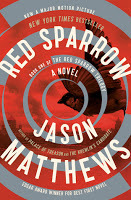 What a superb book, and what a pleasure to discover it. Red Sparrow is a topnotch spy thriller.
What a superb book, and what a pleasure to discover it. Red Sparrow is a topnotch spy thriller. When I learned the author was a former CIA agent, I expected it to be authentic and well researched but clumsily written.
On the contrary, Jason Matthews writes superbly. He has learned a lot from another bestselling author with rather an ordinary name, Thomas Harris.
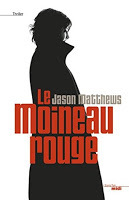 Indeed, in many ways, Jason Matthews's Red Sparrow is the best popular novel I've read since Thomas Harris (and Hannibal Lecter) made their own first big hit with another red creature, Red Dragon, published back in 1981.
Indeed, in many ways, Jason Matthews's Red Sparrow is the best popular novel I've read since Thomas Harris (and Hannibal Lecter) made their own first big hit with another red creature, Red Dragon, published back in 1981.There are several distinct characteristics which distinguish Jason Matthews's prose. He likes to use animal imagery, which he deploys deftly. "Through the pines, the slate-black river was furrowed by the talons of dusk-feeding ospreys."
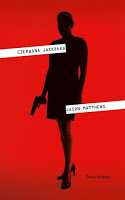 In particular he likes to use animal analogies, as when the heroine's heartless spymaster of an uncle takes her to lunch. "He was staring at her as he ate, his dead eye unblinking, just as a wolf watches even while drinking at a brook."
In particular he likes to use animal analogies, as when the heroine's heartless spymaster of an uncle takes her to lunch. "He was staring at her as he ate, his dead eye unblinking, just as a wolf watches even while drinking at a brook."Or when describing the state's reaction to the suicide of one of her classmates at spy school: "The bear sniffed at the body, then turned its back."
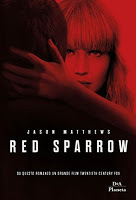 Our heroine is Dominika Egorova, played in the recent film of Red Sparrow, by Jennifer Lawrence. Dominika becomes a spy for Russia after her promising ballet career is abruptly terminated. Her evil uncle wants her trained as a 'sparrow' — a kind of espionage prostitute.
Our heroine is Dominika Egorova, played in the recent film of Red Sparrow, by Jennifer Lawrence. Dominika becomes a spy for Russia after her promising ballet career is abruptly terminated. Her evil uncle wants her trained as a 'sparrow' — a kind of espionage prostitute. She is sent to the sparrow academy to be indoctrinated in "an Upper Volga Kama Sutra". But Dominika resists this "colossal indignity". She has other plans.
She is seething with anger and wants revenge against her uncle and against the state. Dominika carefully conceals this secret plan in "the hurricane room inside her."
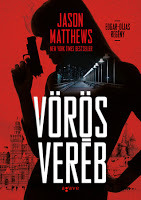
Matthews writes brilliantly, and with welcome humour. A couple of CIA operatives out in the sticks in Connecticut are "like two Bulgarian swineherds in Sofia for the weekend."
A formidable attacker goes after them like an "unstoppable serial killer at a lakeside summer camp."
And later, after another, equally formidable, adversary is finally felled one of our heroes mutters, "let's seriously consider sawing his head off just to be safe".
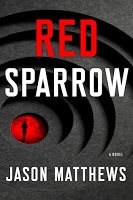
Matthews is also cheeky — he includes a recipe at the end of each chapter, even the most harrowing.
His sources of influence are very interesting indeed. Beside Thomas Harris I detect Ian Fleming — of course.
Indeed Matthews seems to be mischievously referencing James Bond's creator whenever he mentions a "firm dry handshake" (a Fleming obsession).
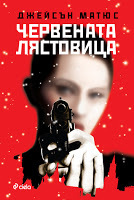 And when a character is described as having "eyes, the whites bluish with health" he seems to be channeling the great John D. MacDonald.
And when a character is described as having "eyes, the whites bluish with health" he seems to be channeling the great John D. MacDonald. But probably the most intriguing inspiration is Patrick O'Brian. When Matthews speaks of a "toad-eater" (a sycophantic lackey) that's O'Brian. Or when he says of Dominika, "How she longed to wipe the eye of the beast" — meaning to give it a good beating — again we hear O'Brian's voice.
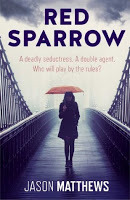 The only reason I read this book is because of the film of it, which I loved. But I love the book even more and I can't recommend it you highly enough.
The only reason I read this book is because of the film of it, which I loved. But I love the book even more and I can't recommend it you highly enough.I intended to compare the book and the film in this blog. However they are so vastly different — and that difference throws up so many issues — that I intend to discuss them in a separate post all on its own.
Stay tuned.
(Image credits: book covers from Good Reads.)
Published on May 27, 2018 02:00
May 20, 2018
Entebbe by Gregory Burke and José Padilha
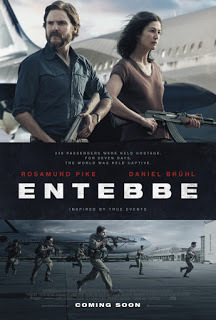 Entebbe — known in America as Seven Days in Entebbe — tells the true story of the hijacking of an Air France passenger jet in 1976 by supporters of the Palestinian Liberation Front.
Entebbe — known in America as Seven Days in Entebbe — tells the true story of the hijacking of an Air France passenger jet in 1976 by supporters of the Palestinian Liberation Front. The plane full of hostages is then flown to Entebbe, the capital of Uganda, a country at the time ruled by the murderous madman, Idi Amin, who gave sanctuary to the hijackers.
A large cohort of the passengers were Israelis returning to their country. And (spoiler for those who don't know their history) the Israeli military staged an astonishing rescue operation.
These dramatic events were turned into at least three movies within a year of taking place, and now they have been filmed again
I'm not sure any movie has ever been quite so overtaken by current events, though. As Entebbe hits our screens the news is full of reports of Israeli soldiers killing dozens of apparently peaceful Palestinian protesters.
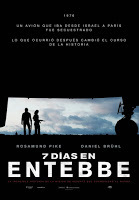 And the prime minister of Israel, Benjamin Netanyahu is all over the media complacently insisting that no wrong has been done...
And the prime minister of Israel, Benjamin Netanyahu is all over the media complacently insisting that no wrong has been done...However, as difficult as it is, let's try and set this all aside and just judge the film Entebbe on its own (considerable) merits.
I was just knocked out by Entebbe. I expected it to be a fairly gripping account of compelling real life events. But it goes way beyond that.
It is, in fact, a genuine work of art.
The story it tells has three focal points. The hostages, the hijackers, and the Israeli government agonising over how to respond.
All are given equal weight, and all feature wonderful actors – notably Eddie Marsan as Shimon Peres, then prime minister of Israel, and Daniel Brühl and Rosamund Pike as two of the hijackers, Böse and Brigitte.
The treatment of Böse and Brigitte in the film is frankly amazing. We care about them and sympathise with them — and yet when they are shot at the end, we welcome their violent demise.
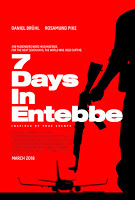 This will give you some idea of the complexity of this narrative, and how brilliantly it it is handled in Entebbe.
This will give you some idea of the complexity of this narrative, and how brilliantly it it is handled in Entebbe.The superb screenplay is by Gregory Burke, a Scots playwright whose previous film script, '71, about a soldier dangerously stranded in the troubles in Northern Ireland, was a modern classic.
And the film is directed by José Padilha, who did the interesting 2014 Robocop remake and has recently been working on the TV series Narcos.
Now, I don't normally credit the directors in the title of these blog posts — film directors get way too much credit already, and screenwriters not enough. But in this case I think Padilha deserves equal billing.
Entebbe begins with sequences of a modern dance troupe, and throughout the action of the movie is intercut with the dancers.
The justification for this is that one of the soldiers, played by Ben Schnetzer, has a girlfriend who is a dancer, played by Andrea Deck (both excellent).
 Now I'm aware that not only is this very tenuous, but it sounds like the most pretentious thing in the world.
Now I'm aware that not only is this very tenuous, but it sounds like the most pretentious thing in the world.And it could — and perhaps should have been — but it was actually stunningly effective.
That's what I meant about Entebbe being a real work of art. Both the screenwriter and the director are bringing great creative energy to bear here, and it all works beautifully to fashion something quite profound.
And the film carries a real punch at the end, which again resonates with events unfolding in the real world. Captions on the screen explain how almost all the hostages were rescued safely, and only one of the Israeli soldiers were killed.
His name was Yonatan Netanyahu. And his brother is Benjamin...
I know that summer is here and the weather may well be glorious wherever you are. But I urge you to spend a couple of hours in a darkened cinema with this amazing film. I don't think you will regret it.
(Image credits: only four posters available at Imp Awards.)
Published on May 20, 2018 02:00
May 13, 2018
Every Day by Andrews and Levithan
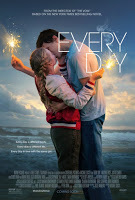 I wish I'd alerted you to this movie sooner, and I wish I'd gone to see it for a second time — because it has disappeared from screens with dismaying swiftness. It clearly isn't a big success, which is a great pity because it's also clearly one of the best films of the year.
I wish I'd alerted you to this movie sooner, and I wish I'd gone to see it for a second time — because it has disappeared from screens with dismaying swiftness. It clearly isn't a big success, which is a great pity because it's also clearly one of the best films of the year. Apparently just a routine teen romance, this is actually science fiction.
It's the story of A. — A. is a strange, body-hopping entity. Every morning A. wakes up in a new human being and inhabits this person, dominating their consciousness until midnight.
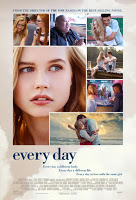 The midnight get-out, Cinderella style, is admittedly a bit hokey. But everything else is here very cool. A.'s entire existence has been spent like this. Until the age of 6 A. didn't even realise that this wasn't the way everyone lived.
The midnight get-out, Cinderella style, is admittedly a bit hokey. But everything else is here very cool. A.'s entire existence has been spent like this. Until the age of 6 A. didn't even realise that this wasn't the way everyone lived.Our story proper begins when A. wakes up in the body of Justin (Justice Smith), a narcissistic teenage jock who is dating Rhiannon (Angourie Rice), a sweet girl he really doesn't deserve.
And A. falls in love with her. Which leaves A. with the problem of wooing Rhiannon, each day in the body of a different teen, of any or all genders.
Not to mention convincing her that this isn't some kind of hoax...
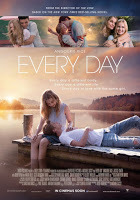 The whole story is beautifully contrived and expertly told. (The script is by Jesse Andrews from a novel by David Levithan.) The acting is first rate, as is the directing, by Michael Sucsy. I even loved the locations in Baltimore (my favourite US city).
The whole story is beautifully contrived and expertly told. (The script is by Jesse Andrews from a novel by David Levithan.) The acting is first rate, as is the directing, by Michael Sucsy. I even loved the locations in Baltimore (my favourite US city).The thing that impressed me most was the gender fluidity of the story. (For once that clichéd phrase is entirely apt.) When Rhiannon finally believes A. and allows herself to fall in love, it just doesn't matter whether A. is male or female or in between. Or ugly or beautiful or in between.
Back in 1969 Robert Silverberg wrote a story called Passengers. It won the Nebula Award for best science fiction short story of that year. It concerned disembodied alien entities who could jump into human beings and take them over.
The big shock ending was when the male protgaonist is made to walk into a gay bar and hook up with another man.
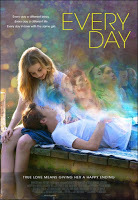 In the world of Every Day this sort of thing is no longer even an issue. Which I think is a sign of how far we've come in fifty years. And the world is now a (slightly) better place.
In the world of Every Day this sort of thing is no longer even an issue. Which I think is a sign of how far we've come in fifty years. And the world is now a (slightly) better place.Every Day is a highly imaginative, touching movie and supremely well crafted. It's a criminal shame that it's not a huge hit
Catch it if you can.
(Image credits: All the posters from Imp Awards.)
Published on May 13, 2018 02:00
May 6, 2018
Victory Disc by Andrew Cartmel
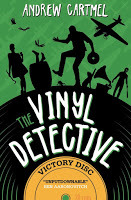 I hope you'll excuse me a bit of shameless self promotion, but my third Vinyl Detective novel comes out this week. Official publication day is Tuesday the 8th of May — although copies are getting into people's hands already and at least one bookstore (naughty Waterstones Leamington Spa) started selling them on the 4th.
I hope you'll excuse me a bit of shameless self promotion, but my third Vinyl Detective novel comes out this week. Official publication day is Tuesday the 8th of May — although copies are getting into people's hands already and at least one bookstore (naughty Waterstones Leamington Spa) started selling them on the 4th.Now, I'm not going to do a big, arm-twisting hard sell on why you should buy this book. Essentially, if you've read and enjoyed the previous instalments (Written in Dead Wax and The Run-Out Groove) then I think you'll like this one, too...
 What I will say is that a lot of your (or at least my) favourite characters are back in this novel, including Erik Make Loud, Clean Head, Stinky and the whole gang. Plus of course the cats Fanny and Turk. (Closely modelled on my own cats Molly and Jade, and included in these books at the instigation and insistence of Ben Aaronovitch. Thank you, Ben!)
What I will say is that a lot of your (or at least my) favourite characters are back in this novel, including Erik Make Loud, Clean Head, Stinky and the whole gang. Plus of course the cats Fanny and Turk. (Closely modelled on my own cats Molly and Jade, and included in these books at the instigation and insistence of Ben Aaronovitch. Thank you, Ben!)There are two aspects of the new story I would like to mention, though. Firstly, it deals with a crime from the past which still has resonances today. Nothing shudderingly original there. This is fertile territory for a detective novel and Ross MacDonald, for one, used it in all his later Lew Archer books.
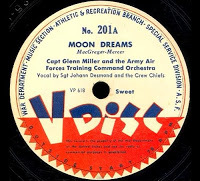
But in this case "the past" is World War Two. Indeed the victory discs alluded to in the title of my novel were a unique product of that conflict.
Popular artists did special recording sessions free of charge, and the resulting discs were distributed to service personnel all over the world as a morale booster.
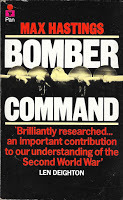
In particular, my plot concerns the British bombing of Europe during that war. My knowledge of — and interest in — this grim chapter of history is entirely the result of two extraordinary books I was lucky enough to read. A factual study entitled Bomber Command by Max Hasting and a novel called Bomber by Len Deighton.
Both are magnificent books and I recommend them to you regardless of whether you have any interest in World War Two or not. They are both masterpieces of their kind, and they will not leave you unchanged. The extraordinary facts I gleaned from them provide a powerful underpinning for the backstory of my novel.

The other aspect I wanted to discuss is the influence of Cornell Woolrich.
I've always regarded my Vinyl Detective novels as part of a lineage of crime fiction which stretches back to Agatha Christie and, beyond that, to Conan Doyle.
Cornell Woolrich was a crime writer of the Golden Age, doing his most prolific work in the pulp magazines of the1930s and 40s, though he was still writing into the 1960s. He is best known today for his short story which was the basis of Alfred Hitchcock's classic film Rear Window.
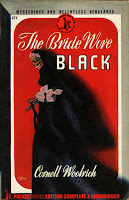
But there is a lot more to Woolrich than that. Specifically, he was as much a master of suspense as Hitchcock ever was.
Cornell Woolrich had a particular knack for propelling his poor characters into the most hellish of situations. Their suffering becomes the suffering of the reader and his best stories will make you end up in a cold sweat with your heart racing.
I was reading a lot of Woolrich around the time I wrote Victory Disc and I decided to try my hand at contriving the sort of nightmare situations of suspense he specialised in. To tell you any more would be to give away too much about this book.
But I do hope you read it, and enjoy it.
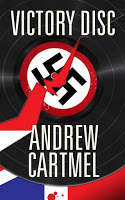 (Okay, now here's the hard sell: British readers can find the book here, with an out of date and wrongly coloured cover. My American friends can find it here, with an equally out of date and wrongly coloured cover.)
(Okay, now here's the hard sell: British readers can find the book here, with an out of date and wrongly coloured cover. My American friends can find it here, with an equally out of date and wrongly coloured cover.)(Image credits: The lovely, correctly coloured, green front cover and green front-and-back cover are courtesy of me. I'd like to thank the splendid Martin Stiff for his beautiful design work on this and also my dear friend Matt West of Miwk Publishing who served as a kind of informal colour consultant for this cover. The wrong, wrong, wrong orangey-yellow cover, which you will still find on Amazon, is also courtesy of me.
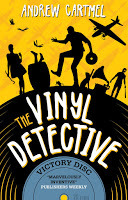 And the cover of Max Hastings's Bomber Command is courtesy of me, me, me too. The image of the V-Disc (Victory Disc) is from a little known site quaintly called Wikipedia. The cover of Len Deighton's Bomber is from Books & Boots. The cover of Woolrich's The Bride Wore Black, with stupendous cover art by H. Lawrence Hoffman, is from ipernity. The striking alternative cover design for Victory Disc, featuring the record, the swastika and the slightly bloody Union Jack is the work of the supremely talented James King. Back in the dark days when I didn't think I would find a publisher for these books I commissioned James to design covers for potential editions to be self-published by me. The fact that it never came to that is thanks to Guy Adams and Miranda Jewess. Blessings be upon you both.)
And the cover of Max Hastings's Bomber Command is courtesy of me, me, me too. The image of the V-Disc (Victory Disc) is from a little known site quaintly called Wikipedia. The cover of Len Deighton's Bomber is from Books & Boots. The cover of Woolrich's The Bride Wore Black, with stupendous cover art by H. Lawrence Hoffman, is from ipernity. The striking alternative cover design for Victory Disc, featuring the record, the swastika and the slightly bloody Union Jack is the work of the supremely talented James King. Back in the dark days when I didn't think I would find a publisher for these books I commissioned James to design covers for potential editions to be self-published by me. The fact that it never came to that is thanks to Guy Adams and Miranda Jewess. Blessings be upon you both.)
Published on May 06, 2018 02:00
April 29, 2018
You Were Never Really Here by Jonathan Ames
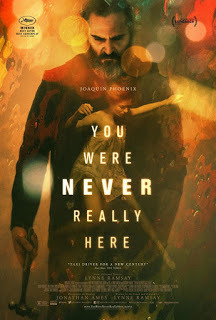 Scots director Lynne Ramsay's most recent film was We Need to Talk About Kevin.
Scots director Lynne Ramsay's most recent film was We Need to Talk About Kevin. 'Recent' is a relative term... that was back in 2011. But it was an impressive and striking film, so I was very much up for seeing her new movie.
We Need to Talk About Kevin was adapted from a novel by Lionel Shriver and You Were Never Really Here is again based on a violent prose story, the novella by Jonathan Ames, an intriguing writer who created the TV series Bored to Death and Blunt Talk.
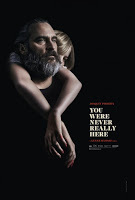 You Were Never Really Here has echoes of Point Blank, but much more emphatically of Taxi Driver — I discovered I was far from the only one to draw this comparison when I saw how heavily the poster campaign leaned on it.
You Were Never Really Here has echoes of Point Blank, but much more emphatically of Taxi Driver — I discovered I was far from the only one to draw this comparison when I saw how heavily the poster campaign leaned on it.It’s the story of a hitman, Joe played by Joaquim Phoenix who is hired to rescue a politician’s young teenage daughter from a creepy bordello. He does so, and all hell breaks loose...
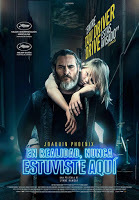 It’s an art movie, but scarily bleak, with profound violence. Also moments of great beauty and strangeness.
It’s an art movie, but scarily bleak, with profound violence. Also moments of great beauty and strangeness. Joe finds that his mother has been murdered by a couple of assassins in suits. He kills them both. It takes one quite a while to die, in Joe’s kitchen.
Joe gives him a pain killer. Then he lies on the floor beside him. They both sing along to a song on the radio, and the assassin reaches over and takes Joe’s hand and clasps it, just before he dies.
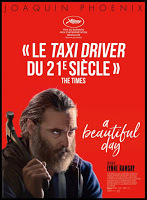 Poetic, moving, and deeply strange. (I'm clearly not the only one to find this scene extraordinary. One of the posters references it.)
Poetic, moving, and deeply strange. (I'm clearly not the only one to find this scene extraordinary. One of the posters references it.)Joe is also suffering massive PTSD after suffering abuse as a child, and serving as a soldier in Iraq. This is superbly presented in fragmented flashbacks without ever being fully spelled out or explained, as it would have been in just about every other film.
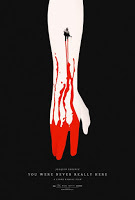 The sound design, by Paul Davies, should have been amazing — sometimes it was amazing — but it had the curious and fatal defect of rendering the most quiet and irrelevant background noise highly audible, while the movie's dialogue was murky and muddy and often incomprehensible. (Maybe on a really state of the art cinema sound system it would have fared better.)
The sound design, by Paul Davies, should have been amazing — sometimes it was amazing — but it had the curious and fatal defect of rendering the most quiet and irrelevant background noise highly audible, while the movie's dialogue was murky and muddy and often incomprehensible. (Maybe on a really state of the art cinema sound system it would have fared better.)Johnny Greenwood provided what was almost a parody Johnny Greenwood score. But it was good.
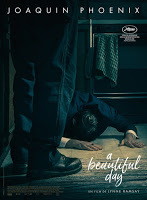
And there was brilliant use of source music — wildly inappropriate cheerful pop songs of yesteryear like 'If I Knew You Were Coming I'd've Baked a Cake' and 'Angel Baby'.
Not a pleasant movie, but a genuine work of art, highly memorable and I’m already feeling faint yearnings to see it again…
(Image credits: For a rather small art movie, this has an amazing number of posters — and some really striking ones — at Imp Awards. Nice.)
Published on April 29, 2018 02:00
April 22, 2018
Tomb Raider by Robertson-Dworet et al
 Although I admire Angelina Jolie, the previous Lara Croft movies were a complete farrago (The Oxford English Dictionary defines a farrago as a "confused mixture" — perfect, eh?).
Although I admire Angelina Jolie, the previous Lara Croft movies were a complete farrago (The Oxford English Dictionary defines a farrago as a "confused mixture" — perfect, eh?). But when I heard that a rebooted franchise was on its way with Alicia Vikander in the title role, I was frankly a little excited.
Vikander is a wonderful actress. I first saw her, with Mads Mikkelsen, in the splendid A Royal Affair and she was recently a highlight of The Man from UNCLE. And it turns out she's terrific in the new Tomb Raider, certainly the finest thing about the whole movie.
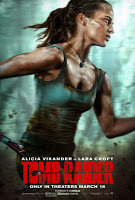 The film is directed by the Norwegian Roar Uthaug, a really cool name but not as cool as Geneva Roberston-Dworet, who co-wrote the first draft of the script with Evan Daugherty (Snow White and the Huntsman). She also co-wrote the final draft with Alistair Siddon.
The film is directed by the Norwegian Roar Uthaug, a really cool name but not as cool as Geneva Roberston-Dworet, who co-wrote the first draft of the script with Evan Daugherty (Snow White and the Huntsman). She also co-wrote the final draft with Alistair Siddon.(In the wacky world of screenplay credits "co-wrote" doesn't necessarily mean any of these people ever actually met...)
The movie begins cannily with Lara as an underdog. She takes a licking in the boxing ring and then we see her in her crappy job as a Deliveroo rider (okay, it's not called Deliveroo, but we all know what they're getting at).
 The film's best sequence is probably one that takes place in this section — a bicycle chase with Lara as the fox pursued by a pack of other cycle couriers as the hounds, in an attempt for her to win a much needed cash prize.
The film's best sequence is probably one that takes place in this section — a bicycle chase with Lara as the fox pursued by a pack of other cycle couriers as the hounds, in an attempt for her to win a much needed cash prize.There's another good action scene when Lara is at the docks in Hong Kong and some street punks rip off her rucksack. Naturally Lara isn't about to stand for that...
And another particularly fine one involving rapids, a waterfall, and the rusting fuselage of a Japanese World War 2 bomber. Lara saves herself from plunging over the waterfall by clambering onto the remains of the bomber... and it immediately begins to fall apart. ("Really?" says our disgusted heroine.)
 Now, you might notice something about all of these action scenes... They're all pretty down to earth. They are not hugely fantastical far-fetched special effects extravaganzas. Those come in the tomb raiding section of the picture, which is for my money absolutely the worst bit of it.
Now, you might notice something about all of these action scenes... They're all pretty down to earth. They are not hugely fantastical far-fetched special effects extravaganzas. Those come in the tomb raiding section of the picture, which is for my money absolutely the worst bit of it.I was also peeved about how the production design ruined a plot point. Lara receives a clue which involves checking out the "first letter" on her father's tomb. The way the tomb has been built, the carving on it reads "In the memory of Lord Richard Croft" — so the intended first letter, the ""R" in Richard, is actually the 18th...
But, like I said, Vikander is the best thing here. Gamine, gutsy and gorgeous, she is endlessly watchable.
 In contrast, a distinguished supporting cast seem oddly like underpowered clones of themselves — I wasn’t even sure that Dominic West was Dominic West or that Walton Goggins was Walton Goggins. I thought they were look-alikes.
In contrast, a distinguished supporting cast seem oddly like underpowered clones of themselves — I wasn’t even sure that Dominic West was Dominic West or that Walton Goggins was Walton Goggins. I thought they were look-alikes. However, there is a good bit where Goggins, as the ruthless, murderous bad-guy-in-chief Vogel, reveals that he really just wants to get home to his wife and kids. (The photo of them on his desk is a particularly nice touch.)
Similarly the sequence where — spoiler alert — Lara discovers her dad (West) is still alive takes the movie out of the action rut briefly, thank god, and provides the opportunity for a bit of human drama. But that's underpowered, too. And at the end the filmmakers commit this terrible sin of killing the father off after all, and as part of that crappy tomb raider sequence. (Lara to her dad: "I haven't come all this way to see you die."... Unfortunately, you have, dear.)
 After Angelina Jolie, the less statuesque and less spectacularly pneumatic Alicia Vikander is a good choice. Her smaller physical stature and her carefully established underdog credentials elicit considerable audience sympathy. They also serve to tone down the inherent sexism of the character.
After Angelina Jolie, the less statuesque and less spectacularly pneumatic Alicia Vikander is a good choice. Her smaller physical stature and her carefully established underdog credentials elicit considerable audience sympathy. They also serve to tone down the inherent sexism of the character. And a bow and arrow instead of two hand guns is another vast improvement. Though I believe both these innovations were already inherent in the recent video game reboot. (The guns turn up at the end, anyway, though.)
The new Tomb Raider is a mixed bag, but not a complete farrago. Alicia Vikander is so good that I actually hope there'll be some sequels. But they still have the problem that no one seems to know what the hell a successful Lara Croft movie should be about.
(Image credits: A surprisingly modest selection of posters at Imp Awards.)
Published on April 22, 2018 02:00
April 15, 2018
Thoroughbreds by Cory Finley
 I was going to post about a high profile blockbuster movie this week, but I've postponed that so I can alert you to a little gem of a film, hopefully before it disappears from your local cinema.
I was going to post about a high profile blockbuster movie this week, but I've postponed that so I can alert you to a little gem of a film, hopefully before it disappears from your local cinema.Thoroughbreds sounds like it's a heartwarming movie about teenage girls and their horses. And, in a twisted way, I suppose you could say that it is...
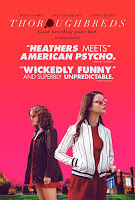 They are teen girls, one of them has a horse (or, rather, did) and I guess it did warm my heart to find such a dark, distinctive and interesting film among the usual multiplex fare.
They are teen girls, one of them has a horse (or, rather, did) and I guess it did warm my heart to find such a dark, distinctive and interesting film among the usual multiplex fare.This is terrific little movie straight out of left field. It has echoes of everything from Heathers to Equus to Stoker.
Lily (Anya Taylor-Joy) seems to be the perfect teen, Amanda (Olivia Cooke) is her troubled friend. But is it really that way around? We are going to find out, as Lily’s hatred of her stepfather Mark (Paul Sparks) graduates slowly to a desire to plot a murder…
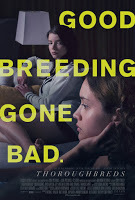 This is a tight, smart, low budget movie which really only focuses on four or five characters.
This is a tight, smart, low budget movie which really only focuses on four or five characters. There is also brilliant economy — and considerable audacity — in some of its staging. The final, bloody, climax takes place offstage while we slowly track in on a girl sitting on a sofa watching TV.
Amazingly, this is a debut feature by Cory Finley, a young playwright influenced by Harold Pinter. I'm very impressed by this guy.
The movie also features a diabolical and wild music score by Erik Friedlander — also making his feature debut! It is one of the finest I’ve heard in recent times.
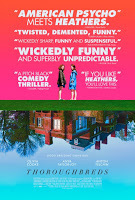
Indeed, the sound design is generally impressive, with great use being made of the oppressive noise of the stepdad’s rowing machine from upstairs.
You should gallop to see Thoroughbreds.
(Image credits: The all-pink background poster is from IMDB. The other three posters from Imp Awards. All of the latter three designs are by Arsonal.)
Published on April 15, 2018 03:33
April 8, 2018
Ten Novels and Their Authors by Somerset Maugham
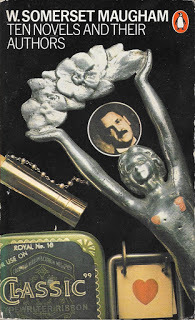 I'm an admirer of the writing of Somerset Maugham, as I've mentioned before. Plus I'm always a sucker for top-ten type lists. But what really clinched this book for me was the cover art — it's part of the Penguin series with ravishing still-life photographs by the great Harri Peccinotti.
I'm an admirer of the writing of Somerset Maugham, as I've mentioned before. Plus I'm always a sucker for top-ten type lists. But what really clinched this book for me was the cover art — it's part of the Penguin series with ravishing still-life photographs by the great Harri Peccinotti.Once I'd finished admiring the cover, though, I got down to considering Maugham's list of "the ten best novels in the world". Here they are:
Tom Jones, Pride and Prejudice, Le Rouge et le Noir, Le Père Goriot, David Copperfield, Madame Bovary, Moby Dick, Wuthering Heights, The Brothers Karamazov, War and Peace.
Okay, so what do I think of this list? Well, I've only read Madame Bovary, Moby Dick, Tom Jones and Pride and Prejudice. Tom Jones is a bit vague, I admit. In fact, am I thinking of Joseph Andrews instead of Tom Jones?
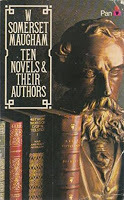 All right — let's say I've definitely read three out of ten. And Madame Bovary is an absolute masterpiece. I was stunned by how modern and vivid and gripping it was. It read like a 20th Century noir novel — something by James M. Cain perhaps, with its character in the grip of a ruinous passion. But far better written than Cain.
All right — let's say I've definitely read three out of ten. And Madame Bovary is an absolute masterpiece. I was stunned by how modern and vivid and gripping it was. It read like a 20th Century noir novel — something by James M. Cain perhaps, with its character in the grip of a ruinous passion. But far better written than Cain.Pride and Prejudice I regard with a sort of mild fondness. I remember being impressed that Austen's prose sometimes recalled Raymond Chandler's in its succinctly evocative descriptions.
Moby Dick was an experience I don't want to repeat. I got through it, but it was a long, hard slog.
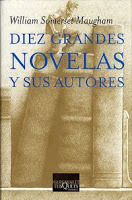 Of the ones on Somerset Maugham's list that I haven't read, I'm in no hurry to get to David Copperfield. Hard Times made me wary of Dickens. Wuthering Heights I took a crack at once, and maybe I'll try again...
Of the ones on Somerset Maugham's list that I haven't read, I'm in no hurry to get to David Copperfield. Hard Times made me wary of Dickens. Wuthering Heights I took a crack at once, and maybe I'll try again...The Brothers Karamazov and War and Peace are unlikely because I've got this thing about Russian novels... the characters have too many god-damned names, which are used indiscriminately and interchangeably. I can never keep track of who they're talking about.
But War and Peace has the Napoleonic wars going for it. So maybe...
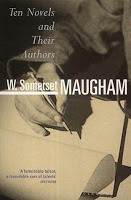 That leaves the French novels. I'm such a chump I thought The Red and the Black was by Zola. But it's by Stendahl. And Le Père Goriot? What the hell is that? Ah, it's Balzac.
That leaves the French novels. I'm such a chump I thought The Red and the Black was by Zola. But it's by Stendahl. And Le Père Goriot? What the hell is that? Ah, it's Balzac.I might give that one a spin. I think of Balzac as being in the same school as Zola, and de Maupassant, whom I revere.
But what of Maugham's own book, about these ten novels? In his characteristically lucid introduction, he addresses the obvious arguments about how any such list must be arbitrary and partial (in both senses of the word — incomplete and biased).
Then he says this astonishing thing:
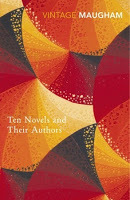 "The wise reader will get the greatest enjoyment out of reading them if he learns the useful art of skipping"
"The wise reader will get the greatest enjoyment out of reading them if he learns the useful art of skipping"Now, I suppose this explains why Moby Dick could make Maugham's list. Because for the all the brilliance of parts of that book, it's way too long and way too meandering.
But let me emphatically say two things here.
If a book requires that you skip chunks of it to enjoy it — or worse yet, simply to manage to get through it — then it has no place on any list of the ten best. The books which do qualify are those which can be read, and enjoyed, in their entirety without skipping.
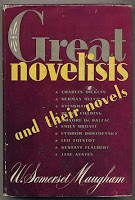 And, equally important, if you have skipped parts of a book you haven't read it. And you can't claim to have read it. You've only read a book if you've read every word.
And, equally important, if you have skipped parts of a book you haven't read it. And you can't claim to have read it. You've only read a book if you've read every word.I think both of these assertions are perfectly fair.
But, to get back to Maugham and his introduction...
It gets worse. Much worse. He goes on to say how, after reading his comments about skipping, an American publisher approached him with a proposal. Why not reissue the ten books on his list, with the cuts done already, by Maugham? In other words, abridge them, and give each one an introduction by Maugham. The old word butcher himself.
And, horrifyingly, Maugham didn't tell the guy to get lost. He thought it was a perfectly valid idea. "There is nothing reprehensible in cutting," he says.
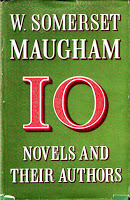 Though he does at least concede,"I cannot think that a single page could be omitted from so enchanting a novel as Pride and Prejudice, or from one so tightly constructed as Madam Bovary."
Though he does at least concede,"I cannot think that a single page could be omitted from so enchanting a novel as Pride and Prejudice, or from one so tightly constructed as Madam Bovary." "Some... will exclaim that it's a shocking thing to mutilate a masterpiece," he concludes.
Well I have to confess that I'm shocked, for that very reason.
And I think considerably less of Maugham after reading that introduction.
(Image credits: The Penguin with beautiful Harri Peccinotti cover photo is scanned from my own copy. The Pan edition is from ABE. The green Heinemann hardcover is from My Maugham Collection, an interesting site which is well worth exploring. The other covers are from Good Reads.)
Published on April 08, 2018 02:00
April 1, 2018
Red Sparrow by Haythe and Matthews
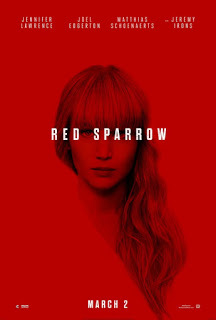 This is a really terrific spy thriller starring Jennifer Lawrence (with bangs — I mean her hairdo. Not gunfire. Although there is that. And not the other kind of bangs. Although there are those, too).
This is a really terrific spy thriller starring Jennifer Lawrence (with bangs — I mean her hairdo. Not gunfire. Although there is that. And not the other kind of bangs. Although there are those, too).I'd heard disappointing reports about this movie, but went to see it anyway and I'm delighted I did. It started strongly and just kept getting better and better, finally concluding with a knockout ending.
Jennifer Lawrence is excellent as Dominika Egorova, a successful ballerina. When Dominika's career as a dancer goes seriously off the rails, her sinister Uncle Vanya (no, honestly) conscripts her as a spy.
Dominika is a distinctive character, vulnerable but volatile. And, while we're on the V's, also violent and vengeful.
 Uncle Vanya is played by Matthias Schoenaerts, a wonderful actor with a chameleon quality, who in this role has been given an hilarious and somewhat disturbing resemblance to Vladimir Putin.
Uncle Vanya is played by Matthias Schoenaerts, a wonderful actor with a chameleon quality, who in this role has been given an hilarious and somewhat disturbing resemblance to Vladimir Putin. The versatile Australian actor Joel Edgerton plays Nate Nash, a CIA operative running a mole in the Kremlin. Nate becomes romantically entangled with Dominika and apparently makes her a double agent.
But is Dominika a double or a triple?
This sort of plot is fairly standard espionage fare, but here it's been given a real freshness, edge and power.
The film benefits from gorgeous wintry photography by Dutch cinematographer Jo Willems who has a gift for bleakly beautiful urban compositions.
It is outstandingly directed by Francis Lawrence who worked with Jennifer Lawrence (no relation) on three out of four Hunger Games movies (which were also photographed by Jo Willems). Francis Lawrence's directing debut was I am Legend.
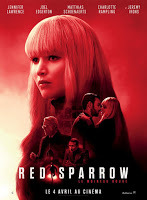
The music is also memorable. James Newton Howard provides an edgy, insistent Bernard Herrmann style score.
The story of Red Sparrow so strong and rich and inventive I wasn’t surprised to see it was based on a novel — a bestseller by Jason Matthews, a former CIA officer. Matthews also won an Edgar award for best first novel. The Edgar (Allan Poe) awards are nominally for mystery fiction but they also embrace spy thrillers.
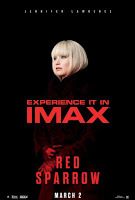 The excellent screenplay was by Justin Haythe who wrote the oddball but memorable A Cure for Wellness and Snitch, a surprisingly good Dwayne Johnson movie.
The excellent screenplay was by Justin Haythe who wrote the oddball but memorable A Cure for Wellness and Snitch, a surprisingly good Dwayne Johnson movie. Red Sparrow has a tone of sexual violence and S&M which makes it distinctively dark and adult. This may be a turn off for some viewers. Otherwise, though, I highly recommend the film.
(Image credits: surprisingly, for such a big movie, only four posters available at good old Imp Awards.)
Published on April 01, 2018 02:03



